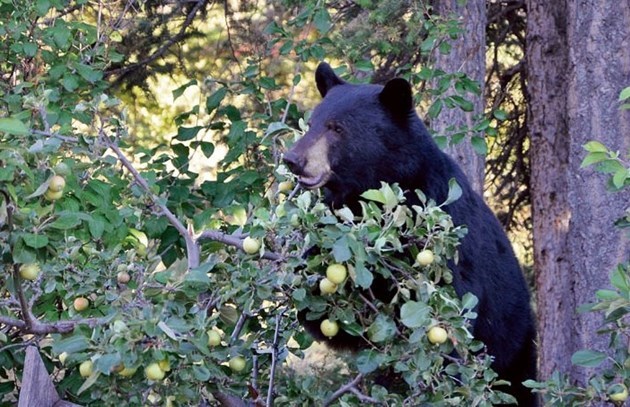BOW VALLEY – Fifteen crabapple trees have been cut down or are about to be removed since word got out that The Boss was back in Banff.
Since Sept. 23, seven trees were removed, including the one grizzly bear 122, a.k.a. The Boss, feasted upon, with eight more scheduled to come down later this week when the contractor is available.
Town of Banff officials say that a recent uptick of 15 tree removals in the last few weeks compares to a total of 22 chopped down over the last eight years under the free fruit tree replacement program.
Michael Hay, manager of environment and sustainability, said the trees are being removed as a result of recent media coverage that The Boss was in town eating apples from trees.
“He’s been around for over 20 years so people know and love this bear and the idea of this bear,” he said.
“When a bear’s life is potentially in danger and there's something they can do about it, they’ve chosen to act, which is fantastic.”
Driven by a strong sense of smell, bears are looking for food at this time of year because there isn’t much natural food remaining on the landscape.
Fruit trees in Banff pose a risk to the safety of people and the survival of bears – which often end up relocated or dead once they get a taste for these calorie-rich food sources and repeatedly enter town.
The Town’s municipal enforcement officers now have the authority to issue an order to remove a tree that has proven to attract bears to feed on the fruit thanks to a stronger council-approved bylaw.
Last week, Parks Canada issued a town-wide bear warning with several black bears and grizzly bears frequenting the area in and around town.
Managing to avoid getting into trouble over his estimated 22 years of life, bear 122 had been feasting on a mule deer carcass in an area east of the Fenlands recreation centre, forcing a closure.
He had wandered west a week earlier after being hazed out of town when he got into apples in a Marmot Crescent backyard on Sept. 23.
The patriarch of Bow Valley bears returned several times in the coming days, but was hazed away by Parks’ dedicated wildlife crew that had been working around the clock to keep him and people safe.
Last week, a persistent black bear repeatedly showed up in Middle Springs neighbourhoods, forcing the wildlife team to repeatedly push it out of the area.
While bear 122 is a high profile grizzly, Hay said all other bears are important too.
“These aren’t a high density species; they have many, many kilometres they range across, so if you see a bear, it’s probably an important bear in that part of the Bow Valley,” he said.
“But if a bear being in danger in this way is what got that response from the public, then we’re getting things done.”
Hay thanked Banff residents who have removed their crabapple trees and took positive steps to eliminate wildlife attractants in town, but noted there are still an estimated 40 crabapple trees remaining.
He said a portion of those are being proactively managed, noting residents have picked the apples or pruned the tree.
“Folks just don’t want to cut them down so we’re going to have to stay on top of them to make sure they’re managing them to remove the fruit,” he said.
“Some of those are located in areas that are right on the edge of town, or where bears have already been seen active. It’s not an issue that is going to go away so there’s lots of work left to do.”
There is no budget cap on Banff’s free fruit tree replacement program, which was established in 2015. Funds come from the rebate budget from the environmental reserve, funded by franchise fees.
“We accept all eligible applicants,” said Hay.
In neighbouring Canmore, the municipality has a fruit tree removal incentive program, which covers 100 per cent of removal costs to a cap of $500.
Adam Robertson, manager of communications for the Town of Canmore, said $10,000 was allocated to the 2023 program, leading to the removal of 94 trees.
“It was fully subscribed at the end of August,” he said.
Canmore council approved a two-year budget in 2023, and as such only amendments will be brought forward in 2024.
“The fruit tree incentive program has $10,000 allocated in 2024,” said Robertson.




